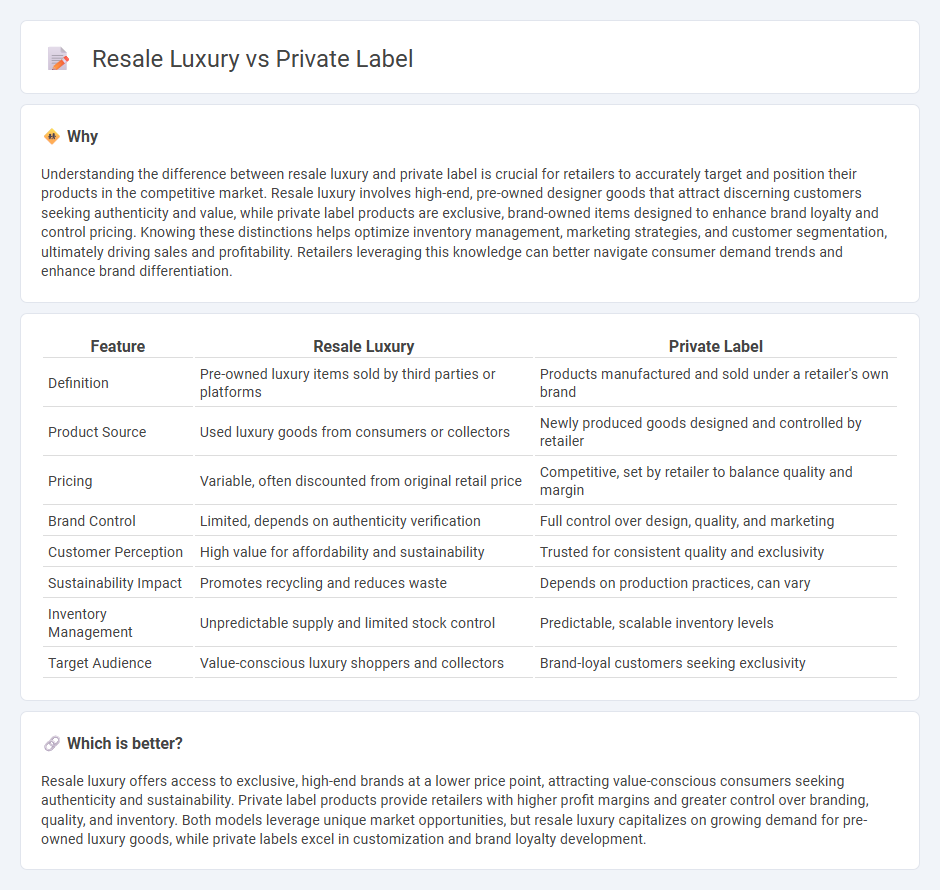
Resale luxury thrives on authenticity, heritage, and sustainability, offering pre-owned high-end products that attract eco-conscious and fashion-savvy consumers. Private label brands focus on exclusivity, cost control, and tailored customer experiences, driving higher margins and brand loyalty through in-house product development. Explore how these contrasting retail strategies impact market dynamics and consumer preferences.
Why it is important
Understanding the difference between resale luxury and private label is crucial for retailers to accurately target and position their products in the competitive market. Resale luxury involves high-end, pre-owned designer goods that attract discerning customers seeking authenticity and value, while private label products are exclusive, brand-owned items designed to enhance brand loyalty and control pricing. Knowing these distinctions helps optimize inventory management, marketing strategies, and customer segmentation, ultimately driving sales and profitability. Retailers leveraging this knowledge can better navigate consumer demand trends and enhance brand differentiation.
Comparison Table
| Feature | Resale Luxury | Private Label |
|---|---|---|
| Definition | Pre-owned luxury items sold by third parties or platforms | Products manufactured and sold under a retailer's own brand |
| Product Source | Used luxury goods from consumers or collectors | Newly produced goods designed and controlled by retailer |
| Pricing | Variable, often discounted from original retail price | Competitive, set by retailer to balance quality and margin |
| Brand Control | Limited, depends on authenticity verification | Full control over design, quality, and marketing |
| Customer Perception | High value for affordability and sustainability | Trusted for consistent quality and exclusivity |
| Sustainability Impact | Promotes recycling and reduces waste | Depends on production practices, can vary |
| Inventory Management | Unpredictable supply and limited stock control | Predictable, scalable inventory levels |
| Target Audience | Value-conscious luxury shoppers and collectors | Brand-loyal customers seeking exclusivity |
Which is better?
Resale luxury offers access to exclusive, high-end brands at a lower price point, attracting value-conscious consumers seeking authenticity and sustainability. Private label products provide retailers with higher profit margins and greater control over branding, quality, and inventory. Both models leverage unique market opportunities, but resale luxury capitalizes on growing demand for pre-owned luxury goods, while private labels excel in customization and brand loyalty development.
Connection
Resale luxury and private label retail are connected through their shared focus on exclusivity and brand value enhancement. Resale luxury platforms capitalize on the high demand for authenticated, pre-owned designer goods, while private labels leverage unique product offerings to build customer loyalty and control brand narratives. Both segments drive sustainable consumer practices and diversify retail market strategies by catering to niche consumer preferences.
Key Terms
Branding
Private label luxury brands offer exclusive control over brand identity, allowing personalized design, storytelling, and customer experience tailored to target markets. Resale luxury relies on established high-end brands with fixed brand narratives but offers opportunities in authenticity verification and curated collections. Explore deeper insights into how branding strategies differ between private label and resale luxury markets.
Profit Margins
Private label luxury products often yield higher profit margins due to control over branding, production costs, and pricing strategies. Resale luxury relies on market demand and condition authenticity, with margins fluctuating based on item rarity and brand popularity. Discover in-depth insights into how profit margins differ between private label and resale luxury markets.
Inventory Control
Private label luxury brands maintain tighter inventory control by producing goods tailored to specific market demands, reducing excess stock and markdowns. Resale luxury platforms depend on third-party consignments, resulting in unpredictable inventory volumes and challenges in forecasting availability. Explore in-depth strategies for optimizing inventory control in private label and resale luxury markets.
Source and External Links
Private label - Wikipedia - A private label is a brand owned by a company, offered exclusively by that company, where products are often outsourced to manufacturers and sold under the company's own brand alongside other national brands.
What Is a Private Label? How Private Labels Work in 2025 - Shopify - Private labeling involves a retailer branding and marketing products manufactured by a third party according to the retailer's specifications, distinguishing private labels from white-label products which are generic and sold by multiple retailers.
40+ Private-Label Products To Sell in 2025 - Shopify - Launching a private-label brand requires legal considerations including product compliance, intellectual property protection, liability coverage, accurate labeling, and strong supplier agreements to protect the business and brand.
 dowidth.com
dowidth.com